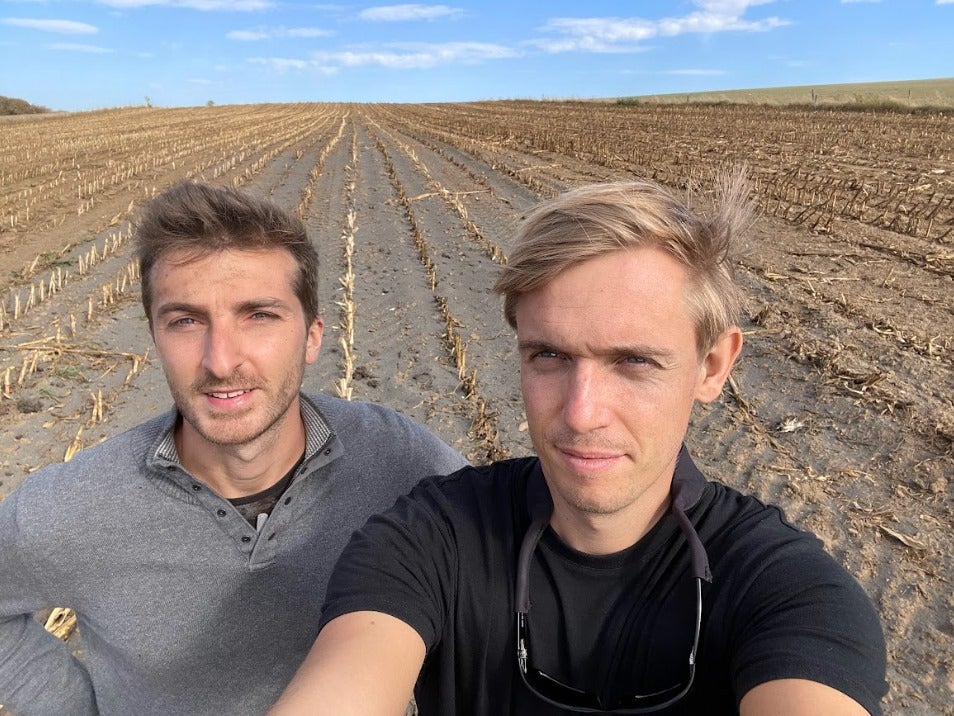Get to know ClimeRock from Techstars Sustainability Paris
Nov 06, 2024

ClimeRock founding team: Antoine Davy (left) and Arthur Chabot (right)
ClimeRock, a French mission-driven company, leverages Enhanced Rock Weathering to combat climate change, removing CO2 permanently and enhancing crop yields sustainably.
1. Which problem are you trying to mediate?
At ClimeRock, we are addressing two critical challenges: climate change and soil degradation. To meet net-zero targets by 2050, on top of drastically reducing our emissions, the world must remove several gigatons of CO₂ annually (IPCC), but current carbon sinks are insufficient. That’s why scalable solutions must be developed now. Simultaneously, soil degradation threatens future food security, with over 33% of global soils already impacted (FAO). Farmers, who depend on healthy soils for food production, face significant challenges: reducing their carbon footprint, maintaining crop yields, and increasing the land’s ability to sequester carbon.
ClimeRock’s Enhanced Rock Weathering (ERW) solution responds to these issues by applying fine silicate rock to soils, which permanently sequesters CO₂ while improving soil health. Our process leverages industrial by-products, promoting a circular economy and delivering benefits for both climate and sustainable agriculture.
Beyond carbon removal, ERW offers co-benefits like balancing soil acidity, releasing essential nutrients to the soil, boosting crop yields, and mitigating ocean acidification. In addition to Climate Action (SDG 13), our work contributes to Zero Hunger (SDG 2), Responsible Consumption and Production (SDG 12), Life below Water (SDG 14), and Life on Land (SDG 15).
2. How did the idea to create the company come to mind? How did your team come to be?
We founded ClimeRock with a shared goal: to create a company that would make a real impact, particularly in carbon removal. After exploring various technologies and reading numerous reports and research papers, we were drawn to Enhanced Rock Weathering (ERW) for its long-term carbon storage potential (thousands of years), low energy requirements and its ability to leverage existing infrastructure. The strong co-benefits for soil health and agriculture made it especially appealing. As two engineers with complementary expertise and a deep commitment to sustainability, we saw an opportunity to bring something innovative to the field, and ClimeRock was born.
Beyond our professional collaboration, we've been close friends for over 15 years, which has provided a strong foundation for this venture. Our families also share a connection to the land: Antoine's grandfather was a farmer, and Arthur's grandfather worked in fertilizer production, making our mission feel even more personal.
3. Why did you choose to participate in the Paris Techstars accelerator program? What are you looking forward to the most?
Techstars is widely recognized as one of the top early-stage investors and accelerators worldwide, and we were thrilled to be selected for the Techstars Sustainability Paris cohort. Being part of this program offers us invaluable access to experienced mentors, a vast network, and tailored resources that will help us refine our business model, sharpen our strategic roadmap, and prepare for future fundraising. We're particularly looking forward to the insights and feedback that will challenge us to accelerate ClimeRock's growth.
4. What are you the most proud of in your initial journey with your company?
One of the moments we're most proud of was launching our first pilots, the very first ERW projects in France. We even had to spread some of the powdered basalt by hand, using buckets! It was a physically demanding but rewarding experience. That’s when everything started to feel real: our mission was taking shape on the ground. Sharing such an experience between founders is great, but the fact that we are also two very good friends made it very special!
5. How do you plan to measure the positive impact of your company in the next 5 years? Environmentally focused question.
In the next five years, we plan to measure ClimeRock’s positive impact using several key metrics:
Tons of CO2 permanently removed from the atmosphere
Hectares of soil regenerated through Enhanced Rock Weathering (ERW)
Cost savings and greenhouse gas emissions reductions for farmers by decreasing their reliance on traditional fertilizers
Tons of by-products or waste repurposed and valorized.
We are also committed to driving innovation in the field of carbon removal. R&D is core to our DNA, which is why we collaborate closely with scientific partners and receive support from organizations like Bpifrance to continuously improve our solution and bring new approaches to the table.
6. Is there anything else you would like to add ?
While we cannot wait to develop carbon removal, it’s important to remember that these solutions must complement, not replace, efforts to reduce emissions. Achieving net-zero requires both approaches working together. In most cases, it is still much more expensive to permanently remove one ton of CO2 from the atmosphere than to avoid emitting it, so reducing emissions must stay the number one priority.
